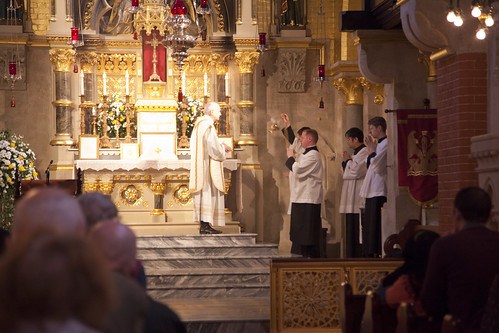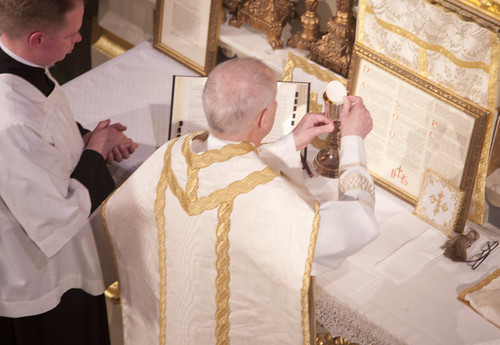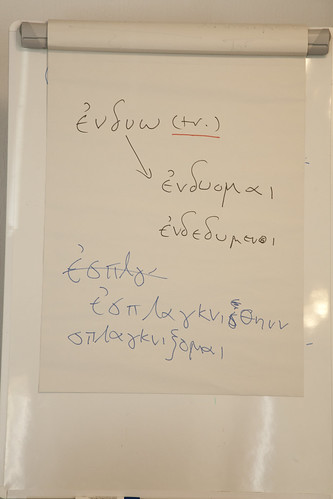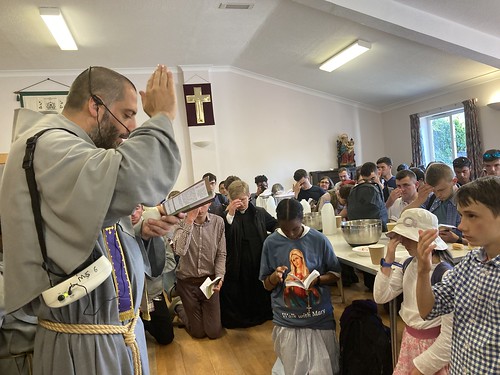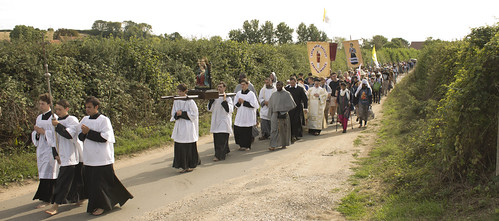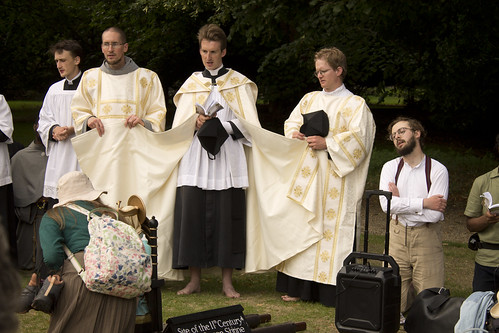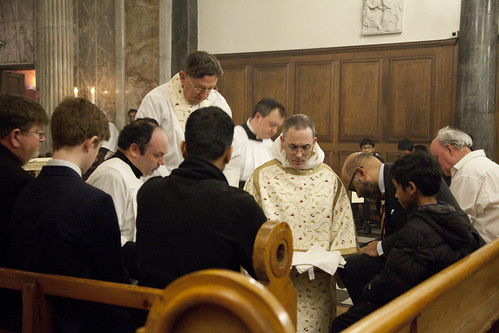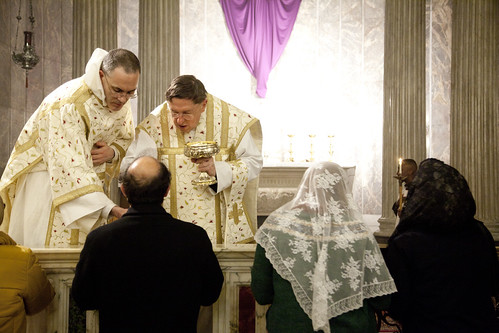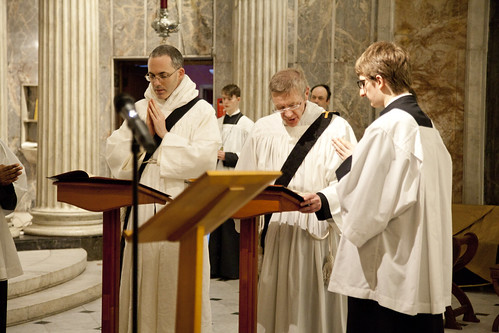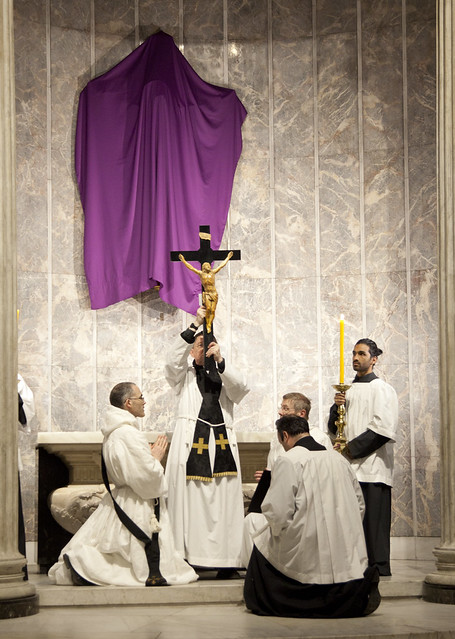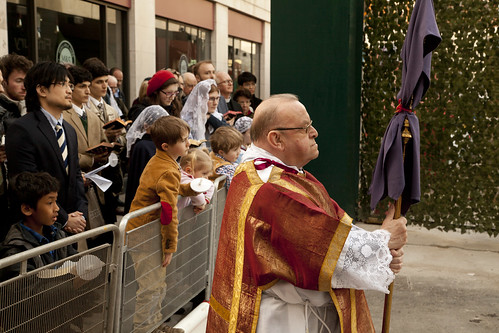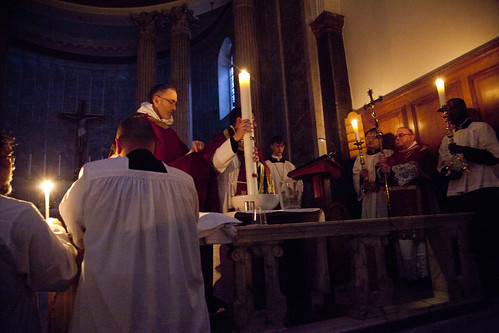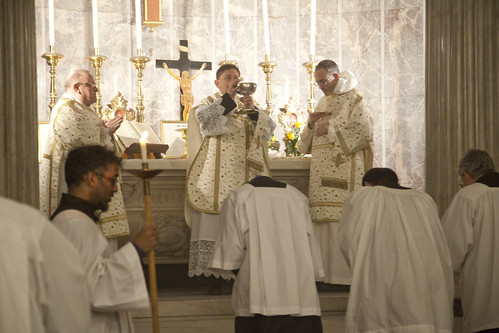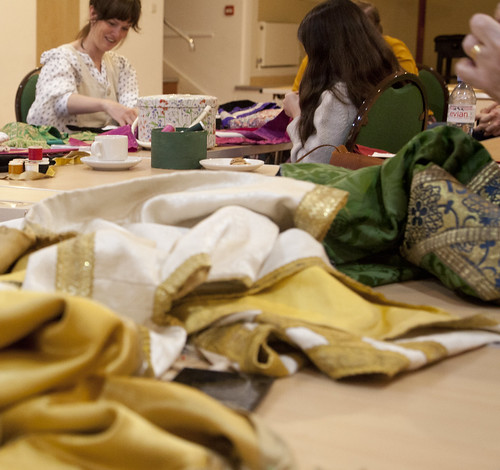Chairman's Blog
Feast of St Joseph in Maiden Lane: Mass for the Catholic Police Guild
The remarkable banner was made in 1939. With the post-Conciliar decline in processions (and indeed guilds) it was in storage for many years. Now it is on the wall in Corpus Christi (above the confessional at the back, if you know the church), and emphasises the connection now established between this church and the Guild.
The church was nearly full for this occasion, and the Southwell Consort excelled themselves with Palestrina, Byrd, and L'Heritier.

We have another great musical programme for Mass on Monday 8th, which will be a Mass of thanksgiving for the Coronation (a Votive Mass of the Holy Ghost). The Southwell Consort will sing music by Tye, Taverner, and Sheppard.
These Masses, organised by the Latin Mass Society, take place every Monday at 6:30pm, in Corpus Christi, Maiden Lane, London WC2E 7NB, between Covent Garden and the Strand, continuing an unbroken tradition going back to before the liturgical reform.
LMS Residential Latin Course 2023
It will run Monday 14th August - Saturday 19th August 2023,
As a language teacher, I have found that my students’ scores in grammar tests have had little to no correlation to their scores in broader interpretive skills such as translation. This suggests that explicit knowledge of parts of the language is a separate beast from the actual ability to use and understand the language.
... meaningful activity is essential to language learning, because making form-meaning connections is the basis of learning a language. Any activity which does not genuinely engage with meaning is missing a crucial element. In order to associate all the various words, phrases, grammar, and syntax with their meaning, we need to encounter them many times in contexts where their meaning matters.
Continental Synodal Reports and the TLM
Europe (pdf)
67. From a fundamental point of view, it is possible to detect the link between Church and liturgy, between ecclesiology and the theology of liturgy: The liturgical dimension in the Church is a place of strong tensions. These tensions are part of a deeper tension of an ecclesiological nature. Ecclesiological tension often arises from a vision of the Church based on one’s own expectations (Italian language working group). In this context, the tensions and sufferings concerning the ancient form of the Roman liturgy should be understood, with explicit references by France, England and Wales, and Nordic countries to the pre-conciliar liturgy according to the Missal of 1962.
North America (pdf)
27. Some participants in the synodal process reported on the profound sense of suffering of those prevented from receiving the Eucharist. While there are a variety of reasons for this reality, perhaps preeminent among them is Catholics who are divorced and remarried without an annulment, and others whose objective situation in life contradicts the beliefs and teachings of the Church. Additionally, some delegates spoke of those wounded by the limitations placed on the pre-conciliar Latin rite. Unfortunately, liturgy is not always experienced as unifying. “We could find our unity in common prayer, but liturgy is one of the things that is divisive in the Church and we must break through that” (Session X Group 18).
Walsingham Pilgrimage: booking open
Easter Triduum Photos from St Mary Moorfields
On Good Friday: for Catholic Answers
One of the markers of the utter desolation of the Chosen People at certain points of their history was the cessation of the daily sacrifice in the Temple: when Solomon’s Temple was destroyed by the Babylonians, when its replacement was defiled by the Seleucid Empire in the time of the Maccabees, and finally when it was destroyed by the Romans in A.D. 70. The profound grief of these moments found expression in the biblical book of Jeremiah’s Lamentations.
A similar note of grief afflicts the Church in contemplating the crucifixion and death of Our Lord Jesus Christ, commemorated most solemnly on Good Friday. The Lamentations form a major element in the traditional services of Matins and Lauds celebrated over the Triduum, called Tenebrae.
We know that the story does not end there: Jesus rose again. Nevertheless, his death was real, and the grief of his mother and disciples was real. The grief of Our Lady was not based on a misunderstanding or a failure to accept God’s will. It was natural, and it was demanded by the occasion: the suffering and death of her Son. The sorrowful stage of the journey was a necessary one: Christ had to suffer through it, and Our Lady, our model, kept him company in that suffering. We must not succumb to the temptation of flipping the pages of the story too quickly to get to the happy ending.
Una Voce International: new edition of Gregorius Magnus magazine

Gregorius Magnus 15, Summer 2023, is now available as a PDF.
and on ISSUU, optimised for mobile devices.
This issue has two appreciations of Pope Benedict XVI and a report of the most recent Summorum Pontificum 'Ad Sedem Petri' Pilgrimage in Rome, and meeting of CIEL in Rome.
Would you like to advertise? Or to contribute to future editions? Click on the links.
Support the Latin Mass Society
Guild of St Clare Sponsorship Scheme for the Royal School of Needlwork
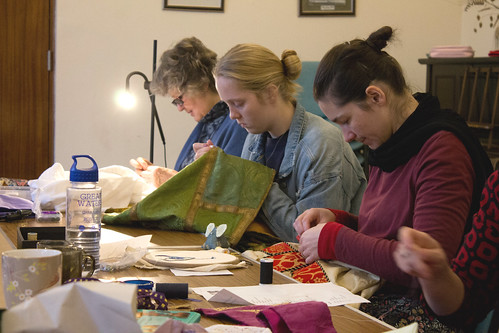 |
| At a Guild of St Clare Sewing Retreat |
Do you have a passion for hand embroidery and the restoration of fine vestments?
We are pleased to announce an exciting sponsorship opportunity for those interested in studying Needlework.
The Guild of St Clare is offering sponsorship for candidates wishing to study The Royal School of Needlework Certificate Course.
Dealine for applications is the 23rd June 2023
See HERE for more information and how to apply.
Reply to Cardinal Roche on the BBC
As I recently wrote on Catholic Answers, the confusion surrounding the meaning of Traditionis custodes, and its flotilla of supplementary documents, is beginning to resemble that around Amoris Laetitia. I was talking specifically about the purpose of the document: what vision of the ecclesial landscape inspires it. Here I want to focus on the equally opaque reasoning behind it.
Last Sunday BBC Radio 4 aired a short report on the Traditional Mass. They talked to the Catholic blogger Maria Jones (do have a look at her channel ‘One of Nine’), a priest who says the TLM, and some Traditional Mass goers they found by chance outside a church. We also heard clips from Austen Ivereigh, papal biographer, and Cardinal Arthur Roche. (Listen here, 5min to 12min.)
On the subject of why TC had been issued, Ivereigh tells us that people who attend the Traditional Mass constitute a sinister ‘movement’ opposed to Vatican II. This claim is presumably inspired by Pope Francis’ 2021 Letter to Bishops. The difficulty with it is that even the most emotional and unsophisticated supporters of the Traditional Mass that the BBC journalists could find lend absolutely no support to this idea. If the ‘movement’ Ivereigh speaks of is only found in some obscure corner of the internet, then it is hard to know why Pope Francis has caused such heartache by restricting the Traditional Mass all over the world.
Cardinal Roche, on the other hand, spoke as follows:
You know the theology of the Church has changed. Whereas before the priest represented, at a distance, all the people. They were channelled, as it were, through this person who alone was celebrating the Mass. It is not only the priest who celebrates the liturgy, but also those who are baptised with him. And that is an enormous statement to make.
This is completely unrelated to the claims made in the Letter to Bishops, and it is hard to think of such a claim being made by a Curial Cardinal before.
On the Rescript: for Catholic Answers
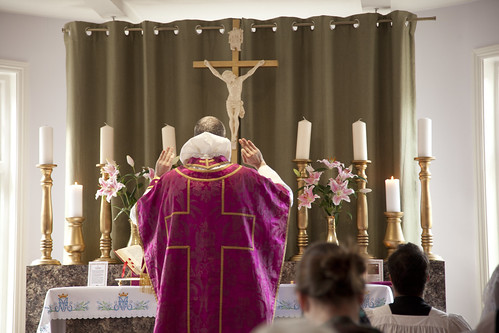 |
| Mass at the most recent Guild of St Clare Sewing Retreat |
The average Catholic may hear the term Rescriptum ex audientia and suddenly remember a number of pressing engagements he has to get to. But this term has profound and troubling implications for the faith life of everyone looking for authoritative, magisterial guidance in how best to follow and worship Our Lord.
What is the Rescriptum, or Rescript? It is a document, published on February 21, that doubles down on restricting the availability of the traditional Latin Mass (TLM). It says that bishops may not allow its celebration in parish churches without the agreement of the Dicastery for Divine Worship in Rome. Up to now, when the Dicastery has been involved in such decisions, the number of places where the TLM has been offered has fallen sharply—for example, from seven to three in the Archdiocese of Washington.
Read it all there.

